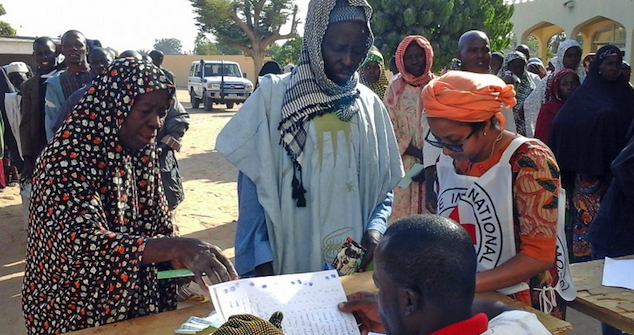Lake Chad: More Needs to be Done for Fighting-Affected Communities

The humanitarian situation in the Lake Chad region is rapidly deteriorating, according to the ICRC Australia Mission.
Months into the conflict in Nigeria, and the ongoing violence continues to claim lives and spread suffering across borders.
Hundreds of thousands of people have had to flee the fighting and are currently living in extremely difficult conditions in the north-east of Nigeria, in Maiduguri, Yola and elsewhere in the country, as well as in bordering Chad, Niger and Cameroon, where the humanitarian situation is deteriorating.
Many of the displaced were forced to flee their homes at short notice, travelling long distances to reach safety, and are now struggling to meet their basic needs. As in most areas of conflict around the world, vulnerable people – including children, women and the elderly – are bearing the brunt of the situation.
Across the Lake Chad region, the International Committee of the Red Cross (ICRC) has stepped up its assistance. Our staff on the ground are providing the displaced with food and household essentials and helping medical facilities to cope with the influx of casualties, but much more needs to be done.
In the north-east of Nigeria, many displaced families have had to settle in schools, government buildings and camps. Others are staying with relatives and host families, putting additional strain on already impoverished communities. Most of those arriving in Maiduguri, bordering Cameroon, in recent weeks were fleeing Baga, scene of heavy fighting about 220 kilometres away. “The vast majority could not afford to buy their own food or other essentials,” reports Janet Angelei, an ICRC delegate working in Nigeria. “They therefore had to rely on the solidarity and generosity of host communities, already struggling to make ends meet, and on humanitarian aid.”
In addition, the lack of sanitary facilities and insufficient water storage capacity in Maiduguri’s camps contributed to the spread of acute diarrhoea among this vulnerable population. We have built latrines and improved access to safe water by increasing the water storage capacity in five camps, which benefited more than 3,000 people.
In recent months, an unprecedented number of people have also fled from Nigeria to Niger, Chad and Cameroon. Nigerians have fled to Niger before, but the current batch of refugees seems determined to stay longer. Many had to leave everything behind when they fled, and have no way of earning a living. The pressure on host communities and local resources is an additional strain on areas already reeling from the drastic slowdown in trade with Nigeria and from a very poor farming and herding season.
In the desperate rush for safety, many family members also had to escape in different directions and consequently many children became separated from their parents, sometimes across borders. In conjunction with the Nigerian Red Cross we have registered unaccompanied minors in internally displaced communities in Yola, Maiduguri, Jos and Kano and worked with parents wishing to report their children missing. Sadly, the number of children waiting to be reunited with their parents is growing. In Chad and Cameroon too, we are focused on helping separated families reunite.
In response to escalating humanitarian needs, the ICRC boosted its budget for Nigeria by 55% to $30.21million AUD for 2015. This is a $10.76million AUD increase on our 2014 budget for the country.
With no end in sight to the fighting and the security situation worsening, we will continue to increase our humanitarian response within Nigeria’s borders and beyond.
This piece has been adapted from an ICRC news release by the ICRC Australia Mission.


